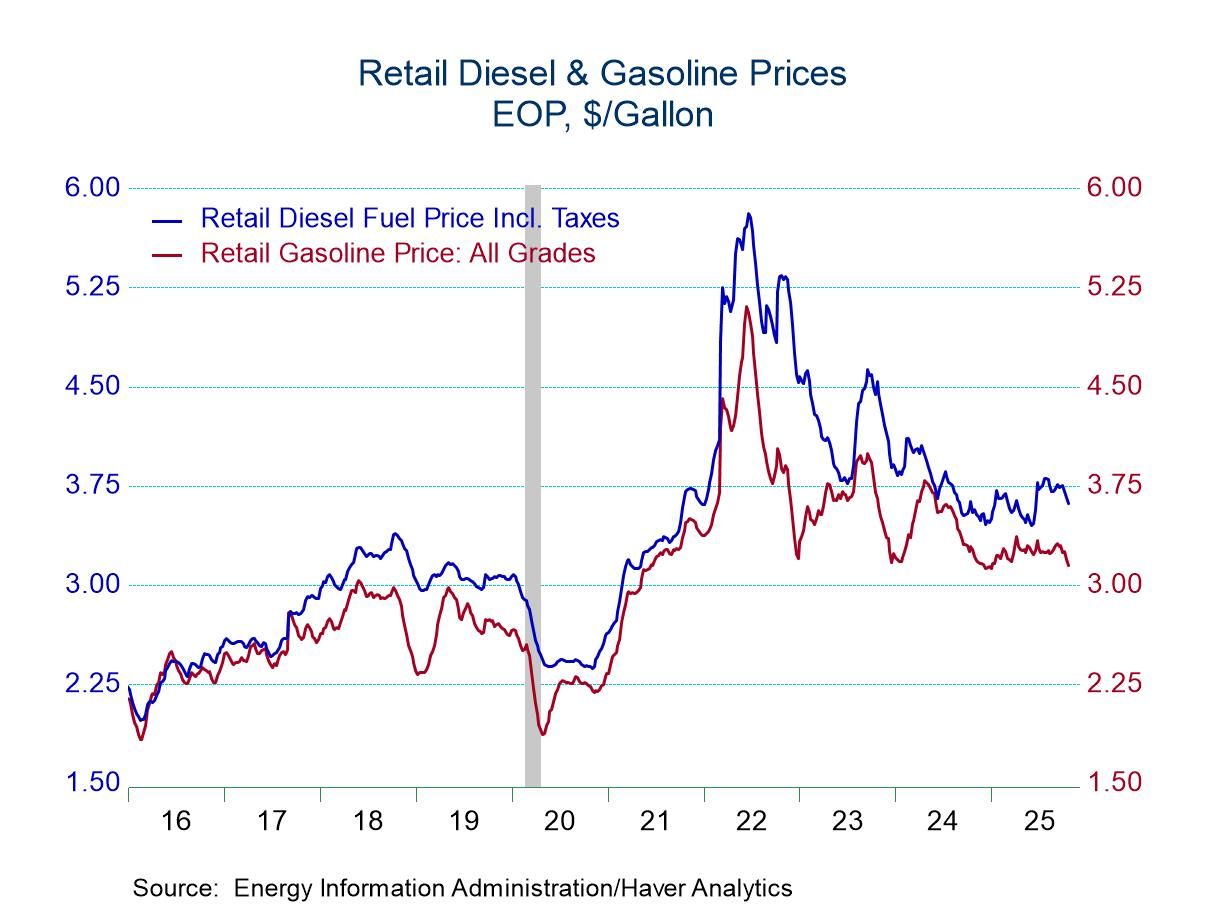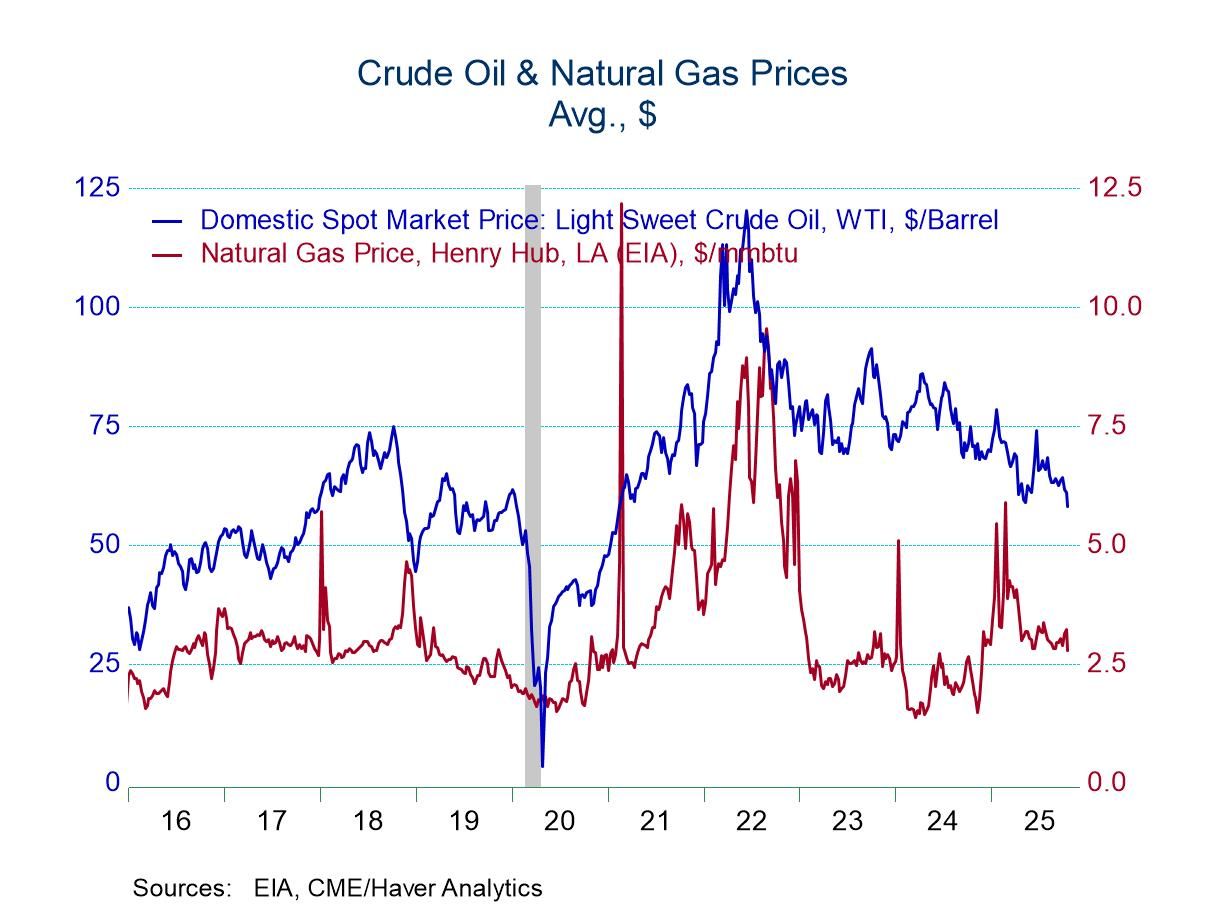U.S. Energy Prices Decline in Latest Week
by:Tom Moeller
|in:Economy in Brief
Summary
- Retail gasoline prices drop sharply in latest week.
- The price of WTI crude oil falls to lowest since 2021.
- Natural gas prices decline to November low.


Retail gasoline prices for all grades declined to $3.15 per gallon (-3.6% y/y), on average, in the week ended October 20th after falling to $3.19 in the previous week. Gasoline prices are at their lowest level since the last week of December. The recent high was $3.79 in the week ending April 22, 2024. Their all-time high of $5.11 occurred in the week ending June 13, 2022. Haver Analytics seasonally adjusts the retail prices of regular grade gasoline. That price eased to $3.00 last week from $3.01 in the previous week.
The price of West Texas Intermediate crude oil fell to $58.29 per barrel (-17.8% y/y) in the week ended October 17 after easing in the prior week to $61.28 per barrel. Prices were at the lowest level since February 2021 and remained below a recent high of $74.17 during the third week of June. The cost of crude oil peaked at $120.46 in the week of June 10, 2022. Yesterday, the price was $57.52 per barrel. The price of European Brent crude declined to $62.36 per barrel (-16.4% y/y) in the week of October 17 from $66.65 in the prior week. Prices remained below a recent high of $95.61 in the week of September 29, 2023, and below a peak of $127.40 in June 2022. Yesterday, the price was $60.71 per barrel.
Natural gas prices plunged to an average $2.80/mmbtu (+30.2% y/y) in the week ended October 17 from $3.23/mmbtu in the prior week. It was the lowest price since the fourth week of November 2024, though prices remained well above the recent low of $1.40/mmbtu in the week of March 15, 2024. Yesterday, the price was $2.99 per mmbtu.
Gasoline demand declined 3.2% y/y in the four weeks ending October 10, following a 2.6% y/y decline in the prior four weeks. Demand for all petroleum products eased 0.5% y/y in the four weeks ending October 10, after a 1.7% y/y increase in the previous four-week period. Crude oil input to refineries rose 1.1% y/y in the four weeks ending October 10, after a 2.0% y/y gain in the prior four weeks.
Gasoline inventories increased 2.9% y/y in the week ending October 10 following a 2.0% y/y gain in the prior week. Residual fuel oil inventories fell 12.3% y/y in the week of October 10, after falling by the same amount y/y in the prior week. By contrast, crude oil inventories rose 3.4% y/y in the week of October 10 after rising 2.7% y/y in the previous week.
Measured in days’ supply, gasoline inventories rose to 25.1 days in the week of October 10 from 24.9 days in the prior week. The recent low was 22.9 days in the week of November 8, 2024. The supply of crude oil rose to 26.5 days in the week of October 10 from 25.7 days in the prior week but remained below a recent high of 31.9 days in the week of March 3, 2023.
These data are reported by the Energy Information Administration of the U.S. Department of Energy. The price and supply/demand data can be found in Haver’s WEEKLY and USENERGY databases.
Tom Moeller
AuthorMore in Author Profile »Prior to joining Haver Analytics in 2000, Mr. Moeller worked as the Economist at Chancellor Capital Management from 1985 to 1999. There, he developed comprehensive economic forecasts and interpreted economic data for equity and fixed income portfolio managers. Also at Chancellor, Mr. Moeller worked as an equity analyst and was responsible for researching and rating companies in the economically sensitive automobile and housing industries for investment in Chancellor’s equity portfolio. Prior to joining Chancellor, Mr. Moeller was an Economist at Citibank from 1979 to 1984. He also analyzed pricing behavior in the metals industry for the Council on Wage and Price Stability in Washington, D.C. In 1999, Mr. Moeller received the award for most accurate forecast from the Forecasters' Club of New York. From 1990 to 1992 he was President of the New York Association for Business Economists. Mr. Moeller earned an M.B.A. in Finance from Fordham University, where he graduated in 1987. He holds a Bachelor of Arts in Economics from George Washington University.
More Economy in Brief
 Global| Feb 05 2026
Global| Feb 05 2026Charts of the Week: Balanced Policy, Resilient Data and AI Narratives
by:Andrew Cates






